Several years ago, I posted an article on my old website about a free (as in beer) Windows-based software studio. Largely due to a KVR post about it getting “stickied,” it gained some popularity, and there has been some interest expressed in an updated version. It’s taken some time, but here’s that update. 🙂
As in the previous article, although I won’t be going into any Linux-only stuff specifically here, I will mention linuxaudio.org as a resource, as well as linuxdaw.org, and there will also be some cross-platform stuff mentioned. I would definitely say that Linux has become a totally valid option for serious audio work, with the amount of quality stuff available continuing to expand.
I will also once again mention Computer Music Magazine for their collection of “magware,” which is worth hitting up one of the occasional back-issue sales for, if nothing else. Although it isn’t as much of a must-have as it may once have been, there’s still some good stuff in there you won’t find elsewhere.
Of course, this isn’t an attempt to cover every possibility, as that is well beyond the scope of a single article. I will be staying away from demo versions of payware, although some “freemium” stuff will be making an appearance this time. I’m not a fan of such things myself, but there are some things (particularly in the host/DAW section) that bear mentioning. There may also be some free versions of things that have a payware “pro” version or something similar, but generally only if I feel that is truly the best option, and it isn’t severely cut down.
As before, one final note before we get started: though this software is all free, donations are a fine way to show your appreciation to the developers if you can spare it.
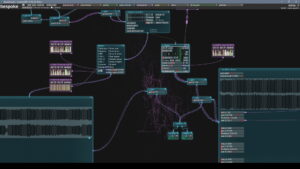
Hosts (Digital Audio Workstations, etc.)
This area has traditionally been the hardest to fill when it comes to freeware, with some exceptions for those who are looking for (or are at least willing to deal with) less standard and/or modern interfaces. These things continue to be true, though the situation has changed a bit since the original article was written. Perhaps most notably, Ardour is no longer only available on Linux (which has been true for some time), and is a free, fully-featured DAW. Another option is Fairlight, part of the DaVinci Resolve family. Although designed more for audio post-production, reports suggest that it makes an excellent DAW for music as well. Tracktion’s Waveform Free is more “freemium” than freeware, but could certainly be used without buying any add-ons. There is also LMMS, which could be compared to FL Studio. Though it began as a Linux-only program, it is now cross-platform. However, it may not best suit those looking mostly for a multitrack recording solution, as opposed to writing music with mostly software instruments.
As has pretty much always been the case, there are several good options out there if you’re into tracker-style software. The successor to ModPlug, OpenMPT, is still very much alive and kicking. Another one carrying on from a classic (in this case, Fasttracker II) is MilkyTracker. Others, such as Psycle and Buzz, remain available, if not necessarily actively developed.
Straying off the beaten path again, Herman Seib’s VSTHost is still around and being updated. It may be somewhat minimal, but might also be just what you need for a live setup, as it can host multiple plugins. It also makes an excellent lightweight test platform alongside other software. A relative newcomer, Bespoke Synth takes a modular-synth style approach similar in ways to something like Bidule. It has a really cool timing and modulation setup, and is fast becoming a favorite around here. On the subject of modular synths, VCV Rack is a software Eurorack simulator with a selection of emulations of hardware modules as well as novel ones, and is another favorite of mine. Although there are payware modules available (and a “pro” version that allows VST hosting, among other things), you can do plenty with it for free. There is also a variant/offshoot called Cardinal, which can be loaded as a VST, but only includes a curated set of (GPLv3+ licensed) modules.
I also have something of an oddball to mention here, because I think it fits more in the DAW section with other trackers, but doesn’t host plugins. This would be Deflemask, a tracker-style program that may not host anything, but does contain great emulations of pretty much every chiptune synth you could want.
ADDENDUM (11/09/21): Another DAW recently crossed my radar, called Stargate. The developers describe it as “a holistic audio production solution, everything you need to make music on a computer.” The linked design principles state that “Stargate is a DAW for everybody, regardless of socio-economic status,” and is tested to be compatible with older and lower-end hardware such as Raspberry Pi 4 or a 15-year-old laptop. The lack of plugin support makes it a rather niche project, but the niche it fills is definitely one I like to see somebody giving attention to.
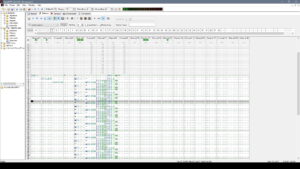
Audio Editors
This is an area that hasn’t changed a whole lot, as the two programs I mentioned last time are still the best options out there. There is one thing worth mentioning, however. Although Audacity is still free and open-source, there has been some controversy concerning data collection since the software was acquired by Muse Group earlier in 2021. I personally prefer Wavosaur anyway. Another option is Ocenaudio, though I experienced some stability issues with it on my system. Ymmv, of course.
ADDENDUM (06/09/23): Tenacity is a cross-platform, open-source audio editor built on top of Audacity, which is worth a look if you were a fan of the original but are looking for an alternative.
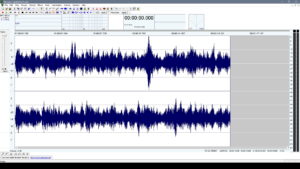
Plugins
This was already a subject too big to completely tackle in 2012 when the first article was written, and of course, things have continued to expand since then. I will repeat what I said last time about common types of synths or effects (such as VA synths or delays) mostly being basically variations on a theme– the point of this being: nobody but you can really judge what the best one is for your needs. That said, I will mention a few things that I think are worth checking out, and point you to a couple of places to find more.
You can get a decent set of basic mixing tools and effects by grabbing the ReaPlugs VST FX Suite (plugin bundle from the developers of REAPER), the mda-vst plugins (updated to 64 bit several years back), and the Dead Duck Software Free Effects suite. Tokyo Dawn Records offers free versions of their plugins, which will fill in some gaps and give you some “character” options for mixing. Variety of Sound has recently been updating their excellent mixing and mastering tools to 64 bit versions as well, and also has a great reverb and delay available. Another great source for mixing and mastering stuff, as well as some very cool and non-standard effects, is Airwindows. Valhalla also has some great free effects in their lineup.
For guitarists, bassists, and those recording them, Ignite Amps has a fine selection of amp sims and other necessities (such as an IR loader) to offer. Their stuff is mostly aimed at the metal crowd, but Voxengo’s Boogex is still there if you need some other sounds. Audified provides a free “LE” version of their GK Amplification 2 bass amp sim, for another option there.
ADDENDUM (06/07/23): Neural Amp Modeler is a free amp profiler based on deep learning, with a wide selection of models available from GitHub.
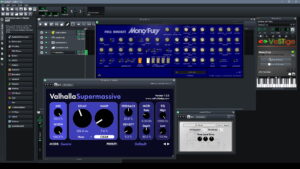
On the instrument side of things, Xhip is an awesome subtractive/VA-style synth, and the developer also has some effects available. Another favorite from that category is Jeremy Evers’ Atlantis, which also comes with a fantastic filter/delay unit based on that section of the synth. Full Bucket Music has a bunch of great synths and effects available, and seems to specialize a bit in cool Korg emulations. Wolfgang Palm’s Plex 2 is an interesting sort of ROMpler/wavetabley thing that’s definitely worth the download. Speaking of wavetables, Surge (formerly from Vember Audio, now open-source) can do those and several other things. Vital is another wavetable synth with a free version, though there are also paid versions which enable more features. The free version is quite capable though, and doesn’t really feel limited. Some other instruments worth checking out are Nils Schneider’s excellent Kawai K1 emulation (Nils K1v), and the FM synths Exakt Lite and Dexed (which also functions as a DX7 manager/librarian).
The area of freeware drum machines is a little more sparsely populated these days, though not entirely barren. 606 Koncept is one from SampleScience which is pretty much what you would expect from the name, and Sampleson’s SUB is a sort of clone/emulation of another X0X machine. If you’re looking for something more realistic, MT Power Drum Kit 2 has you covered, and even includes some “grooves.”
Many who read this will likely also be looking for some type of sampler, and there are a few options out there. For something fully-featured (including a 2GB sound library), you could try Independence Free from Magix. Another option, if you don’t need the library, is the free version of TX16Wx. This is my personal pick of currently-available VSTi samplers. For SoundFont and SFZ playback, there’s Plogue’s sforzando, or sfizz if you’re only worried about using (or making your own) SFZ instruments. Decent Sampler is another choice for those looking to build their own instruments. It uses its own XML-style file format to define instruments, which are similar to SFZ files. Being its own format designed for this plugin, however, the format is also able to include some interesting modulation and effects tricks.
For more, there is of course KVR and their massive plugin database. Of particular interest here is the various Developer Challenges they’ve run over the years, providing many free tools, as well as the ongoing “Old Free VSTi Gems From The Past” and “Freeware VSTeffects roundup 64-bit” threads. Bedroom Producer’s Blog is another great resource.
Other software
A list of utilities and other miscellany. Some older (32 bit) stuff included.
ASIO4All: universal ASIO driver for Windows Audio.
RareWares: provides media compression codecs (lame mp3, ogg vorbis, FLAC, etc.).
Giada: live looping machine.
Polyphone: soundfont/sfz editor.
Mixxx: DJ-style mixing software.
CSound: audio programming language.
LiveSPICE: circuit simulation tool for live audio signals (includes VST plugin for loading circuits).
Paul’s Extreme Sound Stretch: does what it says, and he does mean extreme.
SPEAR: Sinusoidal Partial Editing Analysis and Resynthesis (additive analysis/resynthesis program).
MIDI-Ox: very handy set of MIDI utilities.
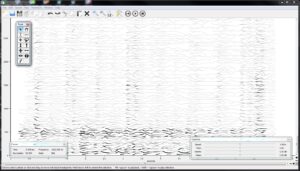
Samples and sample libraries
As one might imagine, there are a ton of great resources for free samples on the net. For starters, I will once again point to this thread and this one on KVR, though there is undoubtedly some outdated info/links in the older posts.
For some more specific suggestions: Freesound.org remains an excellent resource. There is also a bunch of stuff available from the “sfzintruments” GitHub. For orchestral instruments, Virtual Playing Orchestra and VSCO 2 Community Edition both come highly recommended.
Last bit
Well, there you have it– everything you should need to get started making music on your Windows PC, for free. I hope you find this helpful and have some fun with this stuff.
Thanks to the KVR community, which is (still) where I’ve found out about a lot of the things mentioned here, and of course all the freeware developers out there.